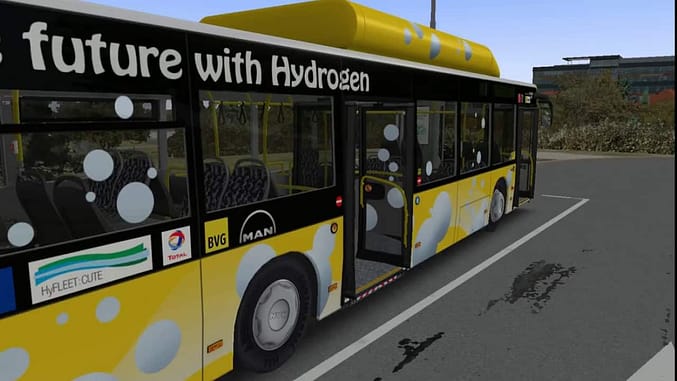Hydrogen Fuel Cell Buses - Europe's GREEN Contribution to Sustainable Transit
Public Transportation Revolution: From CUTE to CHIC
In an effort to create exceptional energy-efficient public transit, and superior standards of environmentally clean public transportation systems, Europe has spent the last couple of decades testing fuel cell buses that utilize hydrogen fuel cells in lieu of traditional fossil fuel sources; such as diesel.
Exploring CHIC’s Origins: CUTE and HyFLEET
The Clean Hydrogen in European Cities (CHIC) project was a project for the development of hydrogen buses. CHIC was preceded by Clean Urban Transport for Europe (CUTE) and HyFLEET:CUTE - two highly successful programs that worked to lay a foundation for hydrogen fuel cell buses.
The original CUTE project started with only a few units, but in just two years (2001-2003), it expanded to 27 buses across 9 European cities; including Hamburg, London, Stockholm, Porto, Barcelona, Stuttgart, Luxembourg, Madrid, and Amsterdam. Overall, this first incarnation of CUTE ran from 2001 to 2006, and the project was deemed a success, paving the way for the next incarnation: HyFLEET.
This second project was responsible for 33 new and improved hydrogen buses. On the whole, HyFLEET garnered even more widespread support for hydrogen public bus programs; eventually operating small hydrogen public bus projects in a few cities around the world, in addition to Europe.
During the start-up phase of CHIC, after evolving from its CUTE origins and under a different corporate entity. CHIC operated 37 hydrogen buses in some of the same regions as the CUTE programs (and added Whistler, Canada).
These areas that CHIC initially rolled out in, were already accustomed to and had some of the infrastructure in place for, hydrogen-based transport. After the initial CHIC rollout (called "phase 0"), phase one expanded operations from Cologne, Hamburg, Berlin, and Whistler - to London, Oslo, Aargau, Bolzano, and Milan; with 26 additional hydrogen buses.
CHIC was rolled out in a few phases -
- Phase “0” consisted of regions with previous experience and knowledge with hydrogen-based transport, which may be seen as leaders, and teachers of CHIC- cities of Cologne, Hamburg, and Berlin in Germany and Whistler, Canada.
- Phase 1 included regions with cities such as Aargau, Bolzano, Milan, London, and Oslo, all seen as natural targets in order to take the next step toward commercialization. There are at least 26 fuel cell buses operating in total spread across these regions.
- Phase 2 included expansion targets, about 14 cities across all of Europe.
Throughout each phase, project implementers gathered a plethora of data, using this to further fine-tune the project’s future. Ultimately, CHIC’s success had significant positive implications for the environment: fuel-cell buses only emit water vapor, unlike their diesel counterparts, which pump carbon dioxide, nitrogen oxide, carbon monoxide, and other greenhouse gases into the atmosphere.
The CHIC project included a few technology improvements compared to HyFLEET:CUTE. The new hydrogen fuel cell buses were a little smaller overall, with an up to 50% improvement in fuel efficiency, and quicker refueling times. The buses also were all equipped with regenerative braking, where some of the energy used for braking is recovered and fed back into the batteries to run the buses.
From CUTE and HyFLEET to H2BusEurope
After the wild success of the CUTE and HyFLEET:CUTE programs, the push to commercialize hydrogen fuel cell buses began, and CHIC was born. The project eventually spanned 14 European regions.
CHIC was funded via a joint partnership between the European Union’s Fuel Cell Hydrogen Joint Undertaking and the European Commission, with a budget of €1.4 billion in total for the period between 2014 and 2016, when the CHIC project successfully reached conclusion.
CHIC was evidence that hydrogen fuel cell buses are a significant, vital part of the future of zero emissions, fossil fuel-free transportation. CHIC started in April 2010, and completed successfully in December 2016. However, much of the CHIC project, its hydrogen fuel cell buses and hydrogen fuel infrastructure, remains active; and the presence and investment in hydrogen fuel cell buses in Europe is expanding.
Now, the EU is doing another, larger hydrogen fuel cell bus project. The first phase of the H2BusEurope project deployed 600 hydrogen fuel cell buses throughout the EU. The following quotes, from Electrive.com, and ngvglobal.com, discuss the H2BusEurope initiative:
"The European Union is pushing to electrify transport on the continent and launched a new programme for fuel cell buses. The H2BusEurope scheme includes 600 hydrogen buses and [H2] infrastructure...
One third of the 600 fuel cell buses have been reserved to go to Denmark as the country expects the delivery of 200 hydrogen-powered buses by 2020. From there they will deploy the stations to the two other countries taking part in the H2BusEurope scheme, namely Great Britain and Latvia." - QUOTE FROM: : electrive.com/600-fuel-cell-buses-and-h2-infrastructure-for-europe
"A H2Bus is a collaborative commitment to enabling commercially competitive hydrogen-fuelled public transportation is aimed at stimulating Europe’s fuel cell vehicle market while addressing transport-related emission targets. Joining forces to create H2Bus Consortium are Everfuel (Denmark), Wrightbus (Ireland), Ballard Power Systems (Canada), Hexagon Composites (Norway), Nel Hydrogen (Norway) and Ryse Hydrogen (UK), leading players in the hydrogen fuel cell electric value chain." FROM - ngvglobal.com/hydrogen-players-commit-to-affordable-fuel-cell-public-transportation
This article, from sustainable-bus.com discusses the state of hydrogen fuel cell buses as of the end of 2020:
"Eleven European cities and regions – Aberdeen (UK), Auxerre (FR), Barcelona (ES), Birmingham (UK), Emmen (NL), Groningen (NL), London (UK), South Holland (NL), South Tyrol (IT), Toulouse (FR), and Wiesbaden (DE) – will join locations already operating hydrogen-powered buses." FROM- sustainable-bus.com/fuel-cell/fuel-cell-bus-hydrogen
Please also see:
